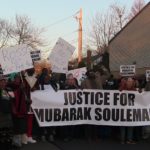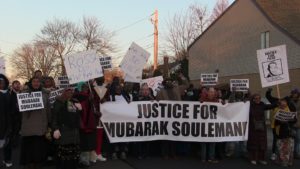Another Martyr and a Call for Mass Rallies to Inspire the CT Legislature


George Floyd, Breonna Taylor, Rayshard Brooks, are names made famous in their martyrdom, blacks killed this year by police. Another name should be added, a young black man named Mubarak Soulemane. The 19-year-old was shot dead in West Haven, Connecticut on January 15 by a state trooper. Soulemane’s name should be better known because the killing was an outrage.
He allegedly hijacked a car at knifepoint in Norwalk, CT and was chased by state police thirty miles along I-95 until he exited in West Haven, a small city next to New Haven. We know what happened next because of body cams of the state police. There the car he was in was surrounded by state and city police vehicles within a minute of him leaving the highway.
A few seconds later a trooper got out of his car, drew his gun and demanded that Soulemane get out of the car. Soulemane remained in the driver’s seat with the windows up. Within a half-minute the trooper told someone on the other side of the car to shoot the 19-year-old with a taser. An officer (likely a West Haven policeman) broke the passenger side window and a taser was shot. Then seconds later Soulemane was shot from the driver’s side seven times with live fire by State Trooper Brian North.
If the facts alleged are true, Soulemane committed offenses, but by the time the car had been surrounded he was helpless. He had nowhere to go. Why the haste to get him out of the car? Why not let him sit for some minutes until he realized his position and gave up? Why not speak to him from a distance and offer to have him speak to a parent or member of the clergy? Why rush to bust a window and then almost immediately shoot him dead?
In Connecticut an investigation by a state attorney has been ongoing since January. That shouldn’t give anyone much comfort. Of the 76 police killings in CT since 2001 only one resulted in a criminal charge and that officer was acquitted. Police have “qualified immunity” according to the U.S. Supreme Court. Since 1967 their killings are improper only if they knowingly violate “clearly established” law. Good luck with that.
In Minneapolis to his credit the mayor, Jacob Frey, took no time in condemning what he saw on video. He connected it up with race and said, “Being black in America should not be a death sentence.” The policeman who killed Floyd and the three other police officers who assisted him were all fired. The mayor called for the arrest of Chauvin, the officer whose knee terminated Floyd George’s life.
In CT there has been silence by public officials. Governor Ned Lamont has said nothing. The local mayor, Nancy Rossi, has only expressed sympathy to the family.
Neither the governor of the mayor has criticized any member of the police or state troopers. Whatever investigation West Haven police made about the incident has not been made public. The West Haven City Council has made no resolution about the matter and launched no investigation. City police refuse to say whether proper procedure was followed or even what proper procedure is in this kind of case. We don’t know if any member of either police force has been disciplined. We don’t know the names of the other troopers or local police involved in the incident. The minutes of the West Haven Board of Police Commissioners do not show that the commissioners even had a discussion of the homicide.
The family is suing the state police and the city of West Haven for its potential liability in the incident. On June 10, Mark Arons, the attorney for the family, told the New Haven Register that he had not received any responses to his requests for information from the West Haven police. The paper reported that the corporation counsel for the city, Lee Tiernan made the only statement about the attitude of the city about the homicide. He stated, “At present I have no information or data to suggest that any member of the West Haven Police Department has engaged in any action that would create any legal liability by the City of West Haven or Police department concerning any Connecticut State Police shooting of any individual.”
The public has demonstrated. In the winter scores of people marched from the killing site to the local police station. Smaller rallies took place in New Haven, where Soulemane lived. After the Floyd killing several hundred at a Soulemane rally took over city streets. In West Haven that day the Register reported 1,000 people marched in a Black Lives Matter rally that was addressed on the local city green by Soulemane’s mother. On June 24, a date that would have been Soulemane’s 20th birthday, members of his family and several score people held an event on the West Haven Green to honor “Mubi,” as his friends called him.
Perhaps solutions for this kind of killing can come at the state level. After many protests in CT cities and even in CT small towns and capped by an eleven-day morning to night fast by a group of Connecticut clergy the governor was persuaded to hold a Special Session of the legislature to deal with police brutality issues. You can be sure the politicians will make the agenda as narrow as possible. But if, say, 10,000 Connecticut residents demonstrated daily outside the Capitol during the session, the pols might make more of an effort.
Here are some measures worth considering:
*** Defund the CT State Police. It appears the base pay for troopers is $100,000 with some making another $250,000 in overtime pay. It seems there’s room here for cutbacks. The Society for Professional Journalists has criticized the CT state police for “blatant disregard” for Freedom of Information Laws. Some legislation or firings of top brass might help in this regard.
*** Take guns away from police. Only allow a certain number of highly trained squads around the state to have firearms. Follow the British model. The fewer deadly weapons police have the more they’ll work to deescalate matters.
*** Require that all positions on local police commissions be elected. Have a procedure for replacement of incompetent police commissioners.
*** Deal with the issue of mass incarceration. End the racist “War on Drugs,” at least in the state. Free those in prison for drug possession or sales. Don’t dump ex-prisoners on a community. Find or build suitable housing, provide social services and create state jobs for the former offenders. Amnesty prisoners who have served decades in prisons for crimes that took place when they were teenagers or young adults.
*** Ban any municipality from taking part in police exchange training programs with Israel. Being trained by a notorious human rights offender only trains police in how to militarize their forces and to see all minorities as suspected enemies.
*** Expend funds to create model public safety programs that could replace policing.
*** Create 100,000 useful state jobs to deal with the soon-to-be catastrophic jobless situation once federal emergency programs run out. These workers could deal with the other emergency, the rapidly closing window to limit greenhouse gas emissions. They could build the housing we need for a low carbon, but disease-ridden world and labor in the industries that would clean-up and replace plastics.
Go big. Ignore the stifling rules of “the practical.” Rise up and seize the day.